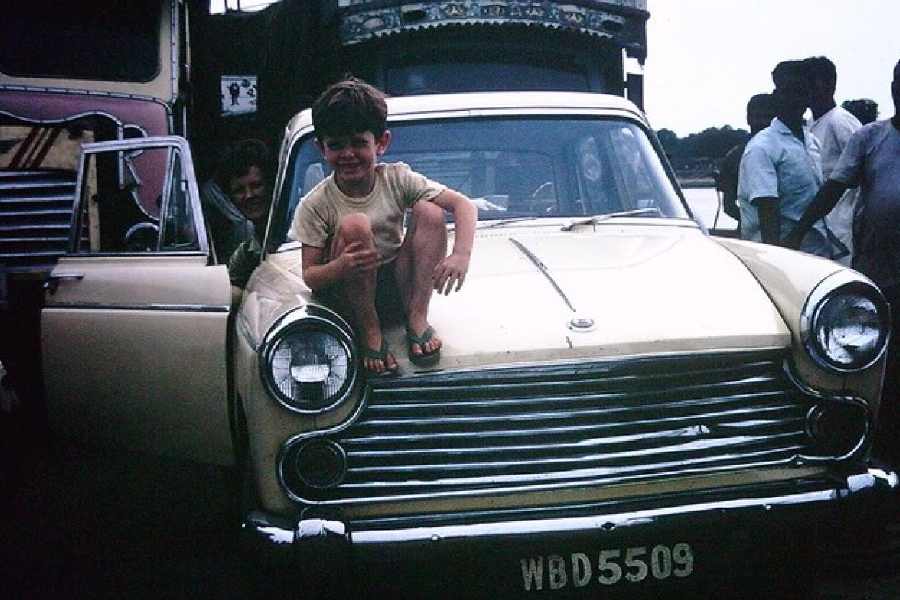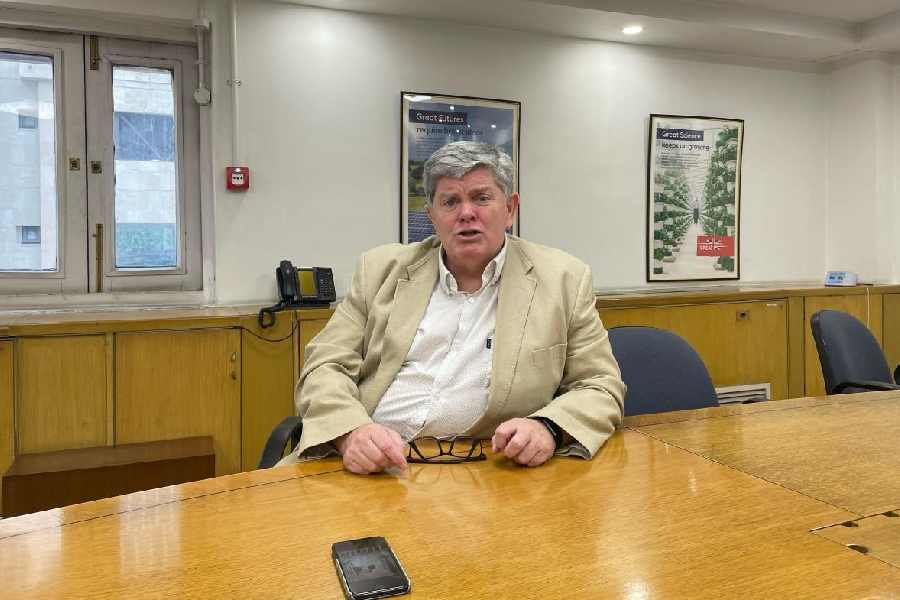Peter Cook wasn’t supposed to come to Calcutta with this assignment. Having been the British deputy high commissioner to Gujarat and Rajasthan since 2019, he was packed and ready to return to the UK. In fact — and this is on good authority — his Indian clothes were already homeward bound when the high commission in New Delhi asked him to fill in briefly for the British deputy high commissioner to Calcutta, Nick Low.
As Cook tells it, the Delhi office knew nothing of his Calcutta connection. “But I am a city boy. Jonmo Woodlands Hospital, Alipore,” says Cook in Scotsman’s Bengali, the kind that Tagore would immediately set to tune.
It was Cook who took to social media to make the announcement — “Bengali born British boy back in town (sic)”. On some days, the posts were in Bengali script, updates about official engagements and events. On other days, he slipped in his personal musings. About? Well, about a building that used to be a school; about a visit to a church with an addendum, “Boys never cry. I admit I did today”. Photographs upon old photographs lit up his timeline — a house in the city, a club, a pond, a road, a taxi — and in and through all of them a little boy growing up, up and up.
This interview with Cook is happening days ahead of the Coronation. Here, in Calcutta, too there is to be a celebration. Cook walks into the conference room of his Ho Chi Minh Sarani office with a happy busy air and like a ruddy Homer starts his story in medias res, which as you know is Latin for the middle of things.
“I went to my first school herein Calcutta, Mrs Johnson’s Preparatory School,” he begins. He continues, “It was on Theatre Road. The school does not exist anymore, but the building is still there and today it is the Aurobindo Bhavan. Every time I see the school, every time I walk past it, I remember going there as a chhoto chhele. I would like to say it has lots of happy memories, but it is a school and I was a little boy and I didn’t like going to school.”
Cook was born in Calcutta on August 15, 1963. His father John Weir and mother Elizabeth had moved to the city the year before. Cook Sr. was the minister at St. Andrew’s Church in BBD Bagh. “The church is still there. Father’s picture is on the wall. His name is still on the list of ministers. And when I walk into that church, the smell is the same,” says Cook.

A snapshot from his time in the city in the 1960s. Picture courtesy Peter Cook
Except for one trip when he was an infant, Cook had never been to the UK till the family finally said goodbye to the city; by then he was almost seven years old. While he was young enough to ride out the transition without any great difficulty, he admits to harbouring “confusions”. For instance, while in Calcutta, Cook remembers his parents saying to him, “One day we shall take you home.” Cook says, “I didn’t understand. I was home.” He says, “I learnt to ride a bicycle here; I learnt to swim here; I also had my first ice cream here. I asked the ice-cream seller in Bengali, ‘What is this?’ and he replied ‘ice cream’. When I went to the UK and learnt that ice cream was called ice cream there too, I thought, ‘Ah! Even here they speak Bengali’.”
Cook has been a diplomat since the early 80s. He has served in Denmark, the US, Qatar, Luxembourg, the Netherlands, Turkey. He says, every time he thought the next posting would be to India. But it never happened till it did, and right at the end of his 40-year-long career too. Cook says, “I was delighted. It wasn’t Bengal, but it was India.”
And then, after he had completed four years in Ahmedabad, the call came. He relives his response. “I said, of course I am happy to go to Calcutta. This is special. This is a city which is too personal for me.”
Cook continues to recount, no, incantate, his memories of the city from the 1960s. Saturday morning shows at Metro cinema watching Laurel and Hardy and Woody Woodpecker. Flying kites in the Maidan. Collecting tadpoles at Diamond Harbour. Sometimes he mixes up places. Sometimes his memory plays tricks on him. The giant gate of the old house on Baburam Ghosh Road appears to have shrunk. Cook recalls how he had trouble pronouncing Baburam. “I called it Bubblegum Ghosh Road.” Cook admits that it was only much later that he could place his singular childhood experience with its varied privileges against a context of history and race and politics.
No story is complete without a reference to his mother. She is the one constant in all the riotous escapades from his boyhood. And now, she is the voice in his ear helping him map his childhood memories onto a much-altered landscape.
Cook says, “There are some things I wish I had more time to do. But I think that is also a nice part of life; that there is always another reason to come back. I started my life in Bengal and now I am ending my professional life in Bengal. This is something that perhaps Rabindranath Tagore would make a little poem about.”
Not sure about Tagore, but Scottish poet Robert Burns might have considered reworking his famous lines. Wee, sleekit, cow’rin, tim’rous beastie/No need for such panic in thy breastie!.../The best laid plans of mice and diplomats/Often go better when left alone etc., etc.










